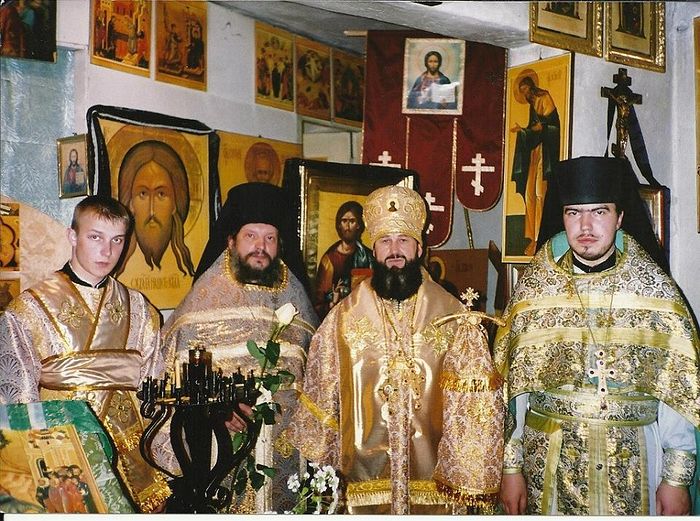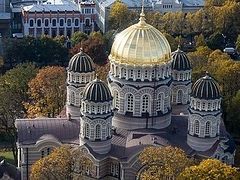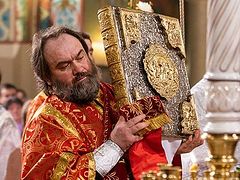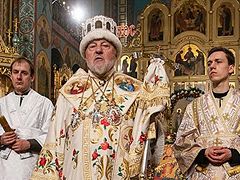Riga, October 30, 2019
The Orthodox community in Latvia may be the next to suffer the same fate as that in Estonia and Ukraine, with divisions created along nationalist-ethnophyletist lines.
On October 24, the Ministry of Justice of the Republic of Latvia officially registered the “Latvian Orthodox Autonomous Church in the jurisdiction of the Patriarchate of Constantinople,” reports the licensed company reporting the data of the Registry of Enterprises of the Republic of Latvia, company.lursoft.tv.
The authors at the “Religion Today” Telegram channel believe it is likely that a “new front will open in the Western orientation of the Russian Orthodox Church,” with the celebration of the registration likely being timed to Latvian Independence Day, November 18.
Further, the channel points to the silence of the Patriarchate of Constantinople: “Constantinople is silent again, as if nothing is happening, although it is unlikely that the Latvian authorities have registered an organization with the name, ‘… in the jurisdiction of the Patriarchate of Constantinople’ without the consent of the Phanar.”
However, while the schismatic “Latvian Orthodox Autonomous Church” (LOAC) has taken up the banner of the Latvian Church of the Patriarchate of Constantinople that operated from 1936 to 1940, it is not clear what, if any, the actual connection between the two is today.
The Riga Vicariate of the Russian Orthodox Church was established in 1836 and became the autonomous Latvian Orthodox Church in 1921 by decision of Patriarch St. Tikhon. In 1936, the Latvian Church broke from the Russian Church and joined the Patriarchate of Constantinople, though it was returned to the Russian Church upon accession of Latvia to the USSR in 1940.
In 1994, several former clerics of the Moscow Patriarchate who left the canonical Church created the LOAC, which considers itself the successor of all Church property of independent Latvia, before it was joined to the Soviet Union.
Today, the LOAC is led by “Archbishop” Viktor Konturozov.
Viktor Konturozov was born in 1944. In 1988, he took monastic vows and was soon ordained a hieromonk within the canonical Russian Orthodox Church. However, in the early 1990s, he announced his resignation from the Moscow Patriarchate and joined ROCOR. He later left ROCOR and in October 1994 was received into the “Russian Orthodox Free Church,” which later became the “Russian Orthodox Autonomous Church” under “Metropolitan” Valentine of Suzdal and Vladimir.
In 1995, he became the “bishop” of Daugavpils and Latvia for the LOAC/ROAC, and in 2000 was raised to the dignity of “archbishop.” He was later released from the ROAC and is now the head of the independent LOAC, which has declared itself to be part of the Patriarchate of Constantinople and has commemorated Patriarch Bartholomew at Divine services since 2011.
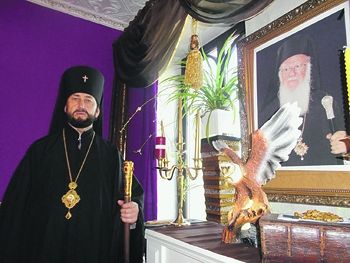 "Archbishop" Viktor Konturozov by a photo of Patriarch Bartholomew. Photo: ng.ru
"Archbishop" Viktor Konturozov by a photo of Patriarch Bartholomew. Photo: ng.ru
A number of sources, including Wikipedia and the Union of Orthodox Journalists, write that the Patriarchate of Constantinople took an interest in the LOAC in 2011, prompting its departure from the ROAC, permitting its hierarchs to commemorate Pat. Bartholomew, though as Wikipedia notes, there is no confirmation that Constantinople recognizes the tiny LOAC. As of 2015, it had about 220 believers in Lavtia.
“Archimandrite” Philaret Romanov (about whom more will be said later) has published a photo of himself in a church in Latvia with an Archimandrite Chrysostom of the Patriarchate of Constantinople, so there has been at least some interaction.
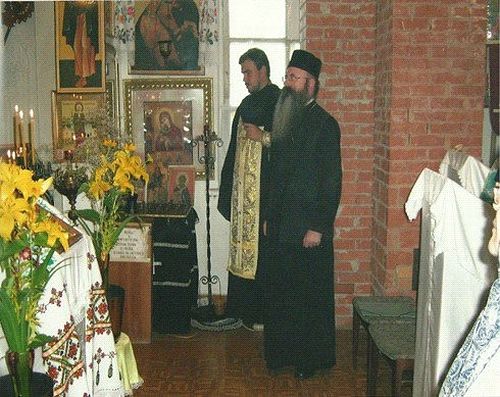 "Archimandrite" Philaret Romanov with Archimandrite Chrysostomos of Contantinople. Photo: gazeta.ua
"Archimandrite" Philaret Romanov with Archimandrite Chrysostomos of Contantinople. Photo: gazeta.ua
Interestingly, an old site of the ROAC’s American Diocese states that the Latvian Church is persecuted for resisting the state’s desire to place all Orthodox churches under Constantinople. “For resisting submission to the Ecumenist Patriarchate of Constantinople, the ROAC/LOAC faithful in Latvia are denied legal recognition by the government,” the site reads.
In the eyes of the canonical Church, Konturozov is deposed and excommunicated as of 1997. There were a number of financial irregularities at the parishes he had served while in the canonical CHurch, and he was willfully disobedient to his bishop and caused public riots. He continued to serve while under ban, and thus was defrocked and later excommunicated.
As with the situation in Ukraine, the schismatic movement in Latvia, though miniscule, is no doubt fueled by ethnic tensions and a fear and distrust of all-things Russia. In an interview in July, Konturozov made sure to refer to his church as the “Latvian Orthodox Autonomous Church (outside of the Moscow Patriarchate).” The Facebook page for the group is entitled, “Latvian Orthodox Autonomous Church Independent of the Moscow Patriarchate.”
“Archimandrite” Philaret Romanov, the right-hand man of Viktor Konturozov and himself an apostate from the Moscow Patriarchate, thinks of the canonical Latvian Church of the Moscow Patriarchate not as a Church that presents the Orthodox teachings of Christ and the holy Eucharist, but as a Church “that came to Latvia with Russian Soviet tanks in 1940.”
The LOAC first tried to register itself with the government in 1996 but was rejected on the basis of a law that stipulated that only one organization from each religious confession could be legally registered. The canonical Latvian Church had already been registered in 1992.
However, a series of legal disputes began in 2017 in which the LOAC presented itself as not a new religious organization, but rather the successor to the Orthodox Church of independent Latvia, which had been under Constantinople for 4 years before 1940. It thus argued that the registration restrictions should not apply to it.
Nationalist Deputy of the ruling coalition Alexander Kirshteyns commented a few weeks ago: “We cannot put pressure on believers from above. But we must admit that the Latvian Orthodox Church of the Patriarchate of Constantinople has never been legally liquidated in Latvia.”
The case eventually culminated in registration of the LOAC on October 24.
Kirshteyns also showed the same nationalist concerns as Philaret Romanov, saying, “It cannot be that we recognize as the only legitimate Church the one that was imposed on us under Stalin, which does not have a Tomos of the Ecumenical Patriarch, which creates chaos in Latvia with the celebration of Christmas,” referring to the fact that the canonical Latvian Church celebrates the Nativity of Christ on January 7.
Latvian parliament has considered making Old Calendar Nativity an official holiday several times, though it has not yet happened.
Interestingly, the Deputy also argued that the LOAC deserves registration because its parishes are home to people who fled Stalinist Russia and to Orthodox from other countries, as well as Catholics and Protestants.
The registration of the LOAC comes just a few months after a new law was passed requiring Orthodox hierarchs to be Latvian citizens and to have lived in the country for at least ten years. While the current primate of the canonical Latvian Church, Metropolitan Alexander, was born in Latvia and holds Latvian citizenship, he recently turned 80 and is in failing health. Some believe he is not able to properly administer the Church.
The time will come to appoint his replacement, and it is believed that the law was passed to prevent the Moscow Patriarchate from sending someone from Russia to replace him. “This law was initiated by the Latvian Special Services, which perceive the Latvian Church as a subordinate Department of Moscow,” said Vladimir Simindei, head of the research programs of the Historical Memory Foundation. It doesn’t help matters, as Simindei notes, that Met. Vladimir is known to have been a KGB agent, as declassified documents have proven.
Riding on the same wave of nationalism, there are also reportedly attempts to change the statutes of the canonical Latvian Church, to increase its degree of independence from Moscow.
In this light, it is likely that the LOAC was also finally registered not only to allow people the possibility of being out from under the “control” of the “Stalinist Church,” but precisely to reduce the influence and prestige of the canonical Latvian Church.
The decision “is a consequence of the adventurous desire of the national elite to inflict a symbolic flick on the nose of the ‘Russian world,’” reads a report from ng.ru.
The parallel between the current situation in Latvia and that in Estonia, and especially in Ukraine, where Constantinople has established parallel jurisdictions in an attempt to weaken the Russian Church, is obvious enough. “Archimandrite” Philaret Romanov openly acknowledges that he is inspired by the Ukrainian schismatic leader “Patriarch” Philaret Denisenko. He traveled to Kiev in 2012-2013 and was moved to tears while attending a service celebrated by Denisenko, whom he considers to be a great religious figure in the post-Soviet space.
As in Ukraine, the Latvian schismatics declare their loyalty to the Patriarchate of Constantinople. It remains to be seen if Constantinople will reciprocate this loyalty.

